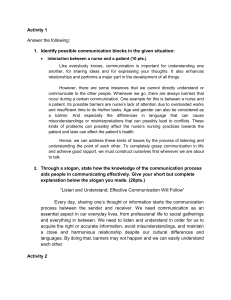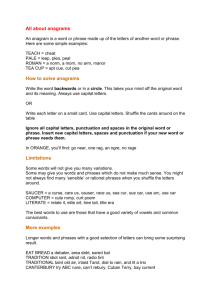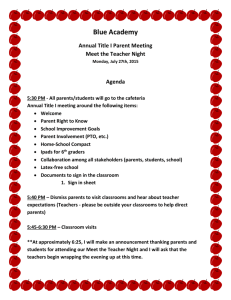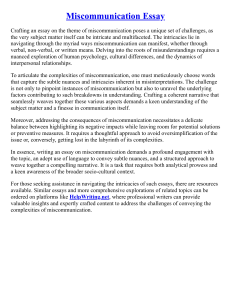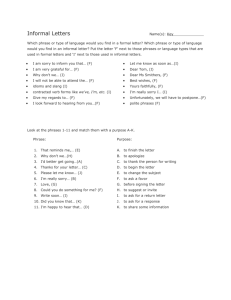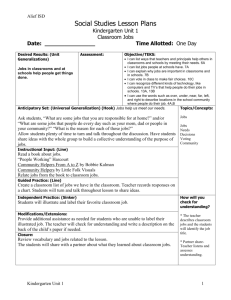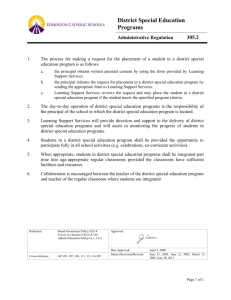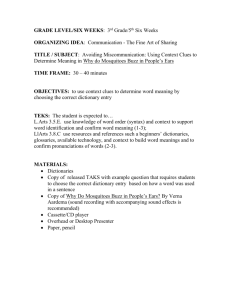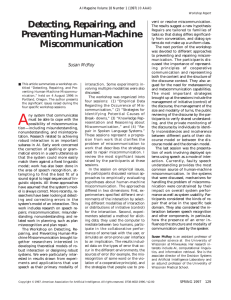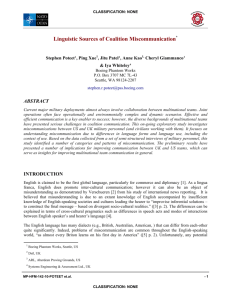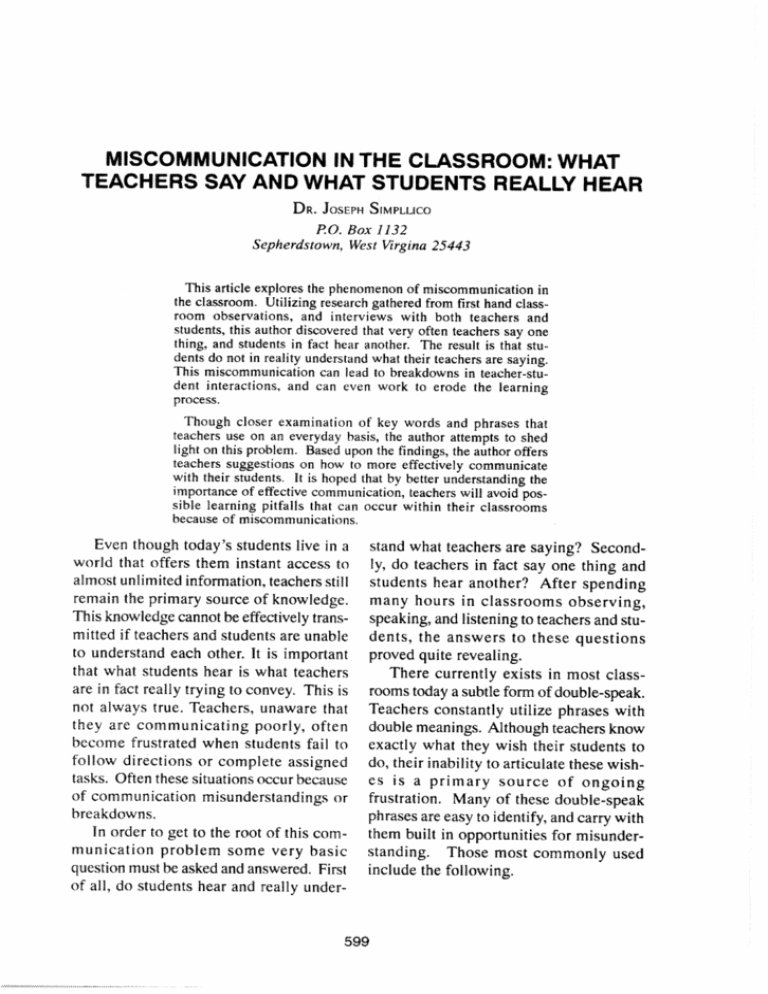
MISCOMMUNICATION IN THE CLASSROOM: WHAT
TEACHERS SAY AND WHAT STUDENTS REALLY HEAR
DR. JOSEPH SIMPLLICO
PO. Box 1132
Sepherdstown, West Virgina 25443
This article explores the phenomenon of miscommunication in
the classroom. Utilizing research gathered from first hand classroom observations, and interviews with both teachers and
students, this author discovered that very often teachers say one
thing, and students in fact hear another. The result is that students do not in reality understand what their teachers are saying.
This miscommunication can lead to breakdowns in teacher-student interactions, and can even work to erode the learning
process.
Though closer examination of key words and phrases that
teachers use on an everyday basis, the author attempts to shed
light on this problem. Based upon the findings, the author offers
teachers suggestions on how to more effectively communicate
with their students. It is hoped that by better understanding the
importance of effective communication, teachers will avoid possible learning pitfalls that can occur within their classrooms
because of miscommunications.
Even though today's students live in a
world that offers them instant access to
almost unlimited information, teachers still
remain the primary source of knowledge.
This knowledge cannot be effectively transmitted if teachers and students are unable
to understand each other. It is important
that what students hear is what teachers
are in fact really trying to convey. This is
not always true. Teachers, unaware that
they are communicating poorly, often
beccome frustrated when students fail to
follow directions or complete assigned
tasks. Often these situations occur because
of communication misunderstandings or
breakdowns.
In order to get to the root of this communication problem some very basic
question must be asked and answered. First
of all, do students hear and really under-
599
stand what teachers are saying? Secondly, do teachers in fact say one thing and
students hear another? After spending
many hours in classrooms observing,
speaking, and listening to teachers and students, the answers to these questions
proved quite revealing.
There currently exists in most classrooms today a subtle form of double-speak.
Teachers constantly utilize phrases with
double meanings. Although teachers know
exactly what they wish their students to
do, their inability to articulate these wishes is a primary source of ongoing
frustration, Many of these double-speak
phrases are easy to identify, and carry with
them built in opportunities for misunderstanding. Those most commonly used
include the following.
600/ Education Vol 1 22 No.3
Okay
This is a simple, and yet very often misunderstood term. When teachers utilize
this word they are in essence asking the
at quesstudents a very simple question.
tion is, do you understand what we have
been speaking about here? Students on
the other hand hear a completely different
question. They hear, do you agree? These
are two very different interpretations of
the word. As a result, students' actions are
usually quite different from what teachers
are anticipating.
When this word for example is used in
connection with course work, teachers,
believing that their students understand,
then move on to more complex ideas. The
result is that students fall behind in their
course work. This is due to the fact that
they lack a basic understanding of the
knowledge the teachers presented,
Substituting a phrase that better assesses what students do in fact understand, and
what materials need to be reviewed, can
greatly enhance instruction. Teachers simply need to ask the following questions
instead. Do you understand this work?
Can you explain it to me in your own
words?These two questions will more
accurately determine if teachers may
indeed move on to the next topic, or must
instead more thoroughly review what they
have just taught.
This Is Important
This often used phrase can best be translated as, this is important to me, the teacher.
Students may not understand that these
words mean that they will most likely be
tested on the materials covered.
While the meaning of the phrase is quite
...
...................................................... I...
:
clear to the teacher, students rarely see the
importance. If students consider the term
at all, they might silently ask themselves,
why? This usually unasked question goes
to the heart of the problem, Why do teachers consistently fail to explain to students
why certain materials are important, or at
least why they are more important than
other course work. If teachers were to take
the time to explain the rationale as to why
certamn materials were more important than
others, it would then follow that students
would come to a better understanding of
where to focus their energies when studying.
You Need To...
Teachers must come to the understanding that students rarely see the need
to do anything that they do not want to do
in the first place. When teachers use the
expression, ... you need to study, or you
need to do your homework, what they are
in actuality saying is that this is important.
The teacher is in reality emphasizing a
point. They are saying that they will take
a close look at how the students perform
in this area. This is an emphasis that is not
always shared because, students do not see
or feel the need to do it, only the teacher
sees the need.
Are There Anv Questions?
No sooner are these words out of teachers' mouths then students begin to shift
their focus and attention. In the everyday
world of the classroom, when teachers utter
this phrase they are actually signaling that
they are ready to move on to something
else. Students have been trained to pick up
on this signal. Instead of being an invita-
........ .
I....
.......- .-1.II"I',
Miscommunication in the.. /601
tion to students to develop insightful questions, these words are often a final curtain
call on a current activity.
Here teachers lose a valuable opportunity to allow students to reflect on what
they have learned, and more importantly,
on what they have not learned. This critical reflection can translate into meaningful
review and learning.
Teachers who casually and repeatedly
use this expression are not accurately determining what students actually understand.
If teachers really want to assess what their
students understand, then they must learn
to develop more effective questioning techniques. They must learn how to query and
probe and entice students to think on higher critical thinking levels. Good
questioning techniques can achieve results.
Simply asking if there are any questions
most assuredly will not achieve this objective.
Words Matter
Use of vague and half understood phrases are not limited to simple conversations
with students. Often teachers establish an
environment for learning, or in some cases
obstacles to that learning, by the language
they choose to use each day in their classrooms. A prime example of this is the use
of the term disability.
With more and more exceptional students entering everyday classes through
programs such as inclusion or mainstreaming, it is essential that teachers
develop a positive mind set when preparing to educate these children. Educators
must come to realize that the word dis-
ability should be viewed as a legal definition of a physical or emotional condition.
It is a statement of a child's condition, not
a definitive set of criteria by which teachers should judge who the child is as a
person.
By simply altering the language that
they use, teachers can make great strides
in changing their own belief systems.
When educators for example, speak of students with challenges, as opposed to
individuals with disabilities, they are well
on their way to making the mental transition of seeing these children as people.
This shift in teachers' attitudes in turn
allows the teachers to define their special
needs students by their potential, not by
their limitations.
A second example of how language can
work to help or hinder the learning process
centers around the need for teachers to
actively emphasize the use of gender-neutral language within their classrooms. Too
often teachers unconsciously utilize terms
that are gender bias. "You guys" may seem
like a harmless term, however it reinforces
societal stereotypes.
Teachers must consciously make an
ongoing effort to eliminate such terms from
their vernacular and must be proactive in
using gender neutral vocabulary that advocates climates of equality. These include
the use of such basic terms as Firefighter
or Police Officer in speech and the use of
plural nouns in writing assignments to
avoid the use of the "his" and "her" trap.
(continued page 478)
478/Education Vol. 122 No. 3
management" and more particularly, sport
marketing gains wider currency and folIowing and is now in vogue.
But just as other countries are curious
about "the American model" and have
expressed an interest In emulating to some
extent what is done in the U.S., there is a
need for the U.S. to observe and develop
a strong club system for sport outside the
school-based performance pyramid or
feeder system. This is needed so that individuals who are cut off from participation
at the intercollegiate sport level have a
chance to develop their skills and are
afforded the opportunity to access high
performance sports.
(continued from p.601)
A Final T
t
Changing even the simplest use of
words is a difficult task for many teachers.
It is more hard work in a job that already
requires a great deal of hard work. In truth
it is easier to continue to utter the same old
hackneyed expressions that teachers have
muttered for centuries. It is easier to just
pretend that students do actualvy understand what is said, even when teachers
know they do not understand. It is also
easier to turn a blind eye to the fact that at
times teachers and students often do speak
different languages.
While it is understood that changing
one small aspect of classroom interaction
between teachers and students will not
bring miraculous results overnight, it
should also be understood that this change
has the potential for producing wondrous
results over time, if teachers are willing to
work hard toward that goal.
Good teachers, those teachers who love
to teach and who truly want their students
to learn, are willing to do yet a little more
hard work. They are willing to fine tune
their skills yet again and again. They are
the professionals who understand that
minor changes often lead to grand achievements.
In the end, these are the teachers that
make a real difference, a difference in the
educational system, and a difference in
their students' lives.
................
....................................- .....
I.............................................................
...............
.
. - - -1111
11.11,11
. .. . ........
COPYRIGHT INFORMATION
TITLE: Miscommunication in the classroom: what teachers say
and what studentsreally hear
SOURCE: Education (Chula Vista, Calif.) 122 no3 Spr 2002
WN: 0210503481005
The magazine publisher is the copyright holder of this article and it
is reproduced with permission. Further reproduction of this article in
violation of the copyright is prohibited..
Copyright 1982-2002 The H.W. Wilson Company.
All rights reserved.

